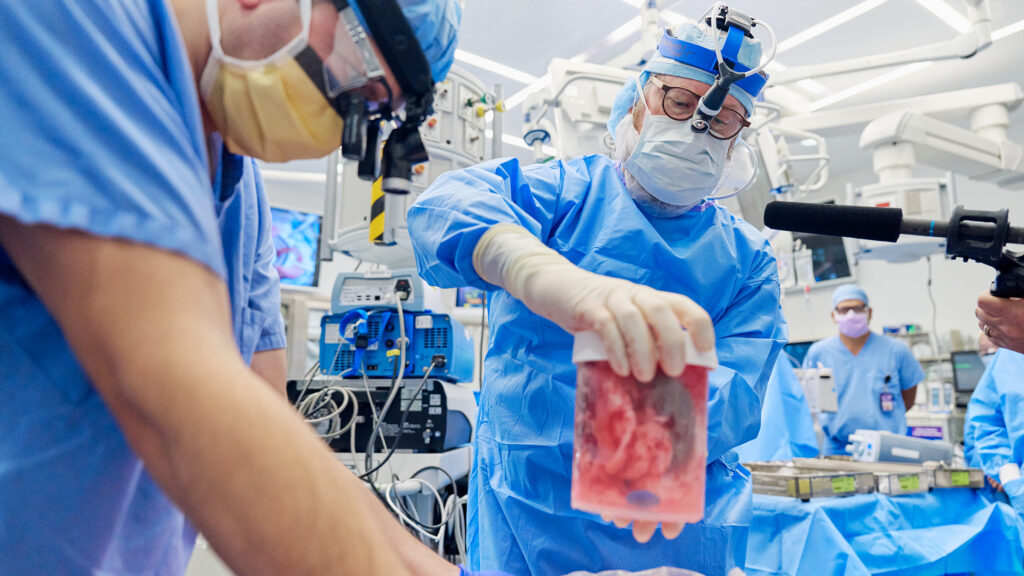Get your daily dose of health and medicine every weekday with STAT’s free newsletter Morning Rounds. Sign up here.
Good morning! Tonight is the season finale of “Survivor.” It’s been a good one & I’m rooting for Rachel. And if any alum from the show want to talk to a health reporter about the long term effects of starving for weeks on national television, you can reach me at [email protected].
advertisement
Woman receives kidney transplant from genetically modified pig
Over seven hours on November 25, surgeons in New York moved a kidney from a genetically modified pig into a 53-year-old woman who had needed a transplant since 2017. This is the third time doctors have performed a kidney transplant with an organ from a genetically modified pig.
“I am overjoyed,” kidney recipient Towana Looney said in a press conference yesterday. “I’m full of energy, got an appetite I’ve never had in eight years. It’s like I can feel the blood pumping through my veins. I can put my hand on this kidney and feel it buzzing, it’s so strong.”
Research on xenotransplantation — from one species to another — has undergone a renaissance in recent years, reports STAT’s Megan Molteni. But the procedures remain experimental and only available to patients too sick to be eligible to receive a human organ. Read more on the latest procedure.
advertisement
On pain during medication abortion
“The pain was really a lot worse than I expected, perhaps because it was compared to bad period pain and my periods have always been fairly pain-free.”
That’s a testimonial from a survey of more than 1,500 people in England and Wales about pain during medication abortion, published yesterday in BMJ Sexual & Reproductive Health. About half of all respondents reported experiencing more pain than they expected. Almost 13% said that if they needed another abortion in the future, they would want a surgical abortion. The majority of that group said that pain was a factor in the decision.
Medication abortions are safe and can be carried out at home. But the results indicate that clinicians could do more to prepare people for the experience. (That being said — it’s a small survey from outside the U.S., so take it all with a grain of salt if you’re looking to extrapolate from the findings.)
Patients and doctors agree on stimulants for ADHD
Stimulants are the best treatment for core symptoms of ADHD like inattention and hyperactivity in adults, according to a systematic review published yesterday in the Lancet Psychiatry that compared medication, psychological, and neurostimulatory options. Both patients and clinicians alike reported better efficacy and equal tolerability when stimulants were compared to placebo. Only clinicians reported improved symptoms when it came to other treatments like cognitive behavioral therapy or transcranial direct current stimulation.
The results are only short term, analyzing effectiveness after 12 weeks of treatment. Little longer-term data exists. While the analysis was rigorous, and appropriately valued patient reports alongside clinicians, it doesn’t mean that non-medication interventions should be dismissed, psychiatrist David Coghill wrote in a commentary published with the study. Medications like stimulants did not improve other outcomes like quality of life.
Behind bars, pleas for help with addiction often go nowhere
There are roughly 2 million people incarcerated in the U.S. — more than any other country by far — spread out over 122 federal prisons, more than 1,500 state prisons, and more than 3,000 local jails. It’s unclear exactly how many of those people suffer from substance use disorders, but existing data points to the majority of them.
If you’ve read the first few parts of the War on Recovery series from STAT’s Lev Facher, then you know there are cheap and highly effective treatments for opioid addiction in methadone or buprenorphine. People who receive these medications while incarcerated are 75% less likely to die of an overdose. But in the latest story in the series, Lev reports that much of the justice system keeps these medications out of reach. More than half of state prisons and an estimated two-thirds of local jails don’t offer medication for opioid addiction in any form.
At least partially as a result, people being released from jail or prison are 129 times more likely than the general population to experience a fatal overdose, according to one estimate. Read more from Lev.
Fixing the ‘failed experiment’ of U.S. health insurance
Luigi Mangione was indicted yesterday on charges including first-degree murder after the killing of UnitedHealthCare CEO Brian Thompson earlier this month. Ever since the shooting, and the subsequent wave of apathetic and resentful responses online, there’s been a spotlight on the flaws within the country’s private health insurance system. In a new First Opinion essay, journalist Merrill Goozner writes, “It is time to put an end to this failed experiment.”
But where to start? First Opinion editor Torie Bosch has called for essays that offer up solutions to the problems highlighted in this cultural moment. Goozner offers his ideas on how to design payment policies that serve patients, not the insurance industry. Read more.
What we’re reading
-
Republicans show no signs of blocking Trump’s health secretary pick RFK Jr. so far, STAT
-
How a young Dutch woman’s life began when she was allowed to die, The Guardian
- 2025’s looking like the year of chronic disease. Here are three issues to watch, STAT
- The weight loss drug gold rush has a dangerous prescription problem, Bloomberg
-
Popular vitamin won’t prevent a fall or fracture in older adults, health panel says. Here’s what can help, CNN

